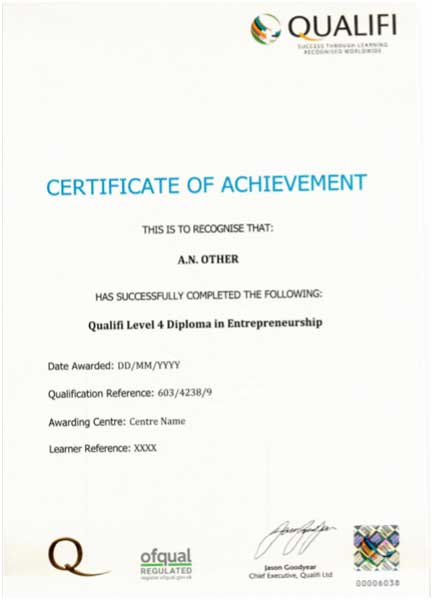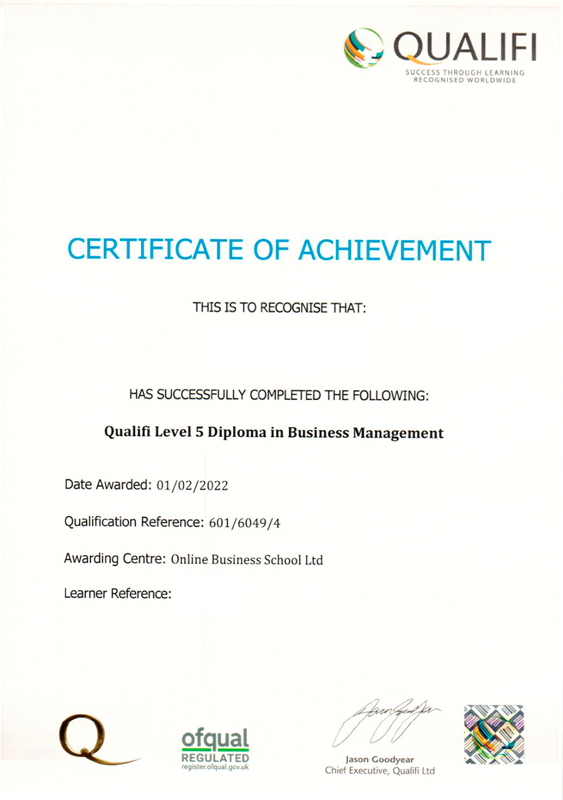Leadership And Team Working, UNIVERSITY 1st and 2nd Year (LEVEL 4 and 5)
LEADERSHIP AND TEAM WORKING
UNIVERSITY 1st Year
LEVELS: 4 | CREDITS: 120 | £4999
LEADERSHIP AND TEAM WORKING
UNIVERSITY 2nd Year
LEVELS: 5 | CREDITS: 120 | £4999
About This Course
The undergraduate level 4 (diploma in leadership and teamwork) and level 5 (diploma in business management) are a 240 credit course designed to fast track students to the final year of an associated undergraduate degree in leadership and management, which can either be completed at a UK university on campus or via distance learning.
The level 4 modules and assignments of this course are equivalent to the first year of a university degree and the level 5 modules and assignments are equivalent to the second year of a university degree.
This course is made up of 10 level 4 modules (120 credits) and 10 level 5 modules (120 credits); each level also includes 10 written assignments. If a student decides to only study at level 4, they will receive 120 credits and can apply for an exemption from the first year of a university degree course.
Each module consists of approximately 40 guided learning hours of material with an additional 30-50 hours of optional learning material. These materials comprise recommended exercises, recommended readings and internet resources.
Examples of University Progression
Awarding Body
Qualification
Am I eligible for this programme?
To enrol onto the level 4 course, you must be at least 18 and have a full secondary education. Before enrolling onto the level 5 course, you must have attained a level 4 or equivalent.
Course Fees
The fee for enrolling onto the level 4 and level 5 courses are £4999 each.
Students can make payment using one of the following methods:
- Credit or Debit Card
- Bank Transfer
- Interest Free Monthly installments
- Western Union
What is included in the cost of my course?
- All course material, including online modules and written assignments.
- Personal tutor support with 1-2-1 Zoom sessions where required.
- Dedicated student support
- Access to an online social learning forum
- Assignment marking and feedback.
Level: 4 Module Listing
Managing people in organizations
Effective management of people within an organization is essential if the objectives of the organization are to be achieved. People represent the single most important resource of the organization and their needs must be understood and respected.
Culture and the organization
What is culture? What do you associate with culture? Perhaps art and music, perhaps values and beliefs, language and communication, behavior culture is a collection of all of these things. Terpstra and David (1991) define culture as ‘a learned, shared, interrelated set of symbols which unite and identify members of society’.
Developing personal skills
The manager working in a modern organization needs a wide range of skills. The manager needs to be able to work with people. This may involve a very wide range of skills in communication, leadership, encouraging teamwork, listening, and so on.
Effective communication
During a typical day, a manager is likely to encourage team members, tell them about a change in their future work or conditions, take part in a formal meeting, have an informal conversation at the water cooler or coffee machine, study a strategy planned by senior management, send e-mails to customers or suppliers, and search the Web.
Managing ethically
Unfortunately, it is not always easy to decide on what we mean by ‘the right action’. For example, think of the company that produces excessive amounts of waste in its factory. Closing the factory will harm the employees and shareholders, and will reduce the amount of money available in the local community. Keeping it open without reducing waste will damage the environment for local people and future generations.
Performance management
The people in an organization determine whether the organization is successful or not. Think for a moment about any organization – in doing this you will also be thinking about people. Every organization has people within it, and the success of the organization is largely due to those people.
Strategic human resource management
Human Resource Management is the management of a key resource in the organization – people. Without people, there is a limit to what the organization can achieve. The machines cannot operate without people to work them (even if they are automatic machines there needs to be a person who programs them). The raw materials need to be turned into something that can be sold: this requires people. The computers need people to operate them.
High-performance teams
In a world of change, uncertainty, and complexity, high performance in an organization requires a blend of diverse skills and experiences. Organizations recognize that this blend is best achieved through team working.
Leadership skills
Good leadership is essential for success in any organization, whether private or public sector. Today, rapid change, in the form of a constantly changing competitive environment, innovations in technology and changing economic conditions, have led to the realization that leadership is a skill to be developed.
Motivating and influencing people
Think about two teams carrying out the same activity. Their manager may ask how a series of tasks will be completed to create a product or service. The manager can plan how the work will be done, make sure that the teams have all the right materials, explain everyone’s tasks and deadlines, and measure progress once they get started. However, the two teams will almost certainly not work at the same speed, not create the output of the same quality, nor show the same attitude to their work.
Level: 5 Module Listing
The entrepreneurial manager
What is an Entrepreneur? Examine the skills and qualities of entrepreneurship.
Organization structures
Why are organizations structured in the way they are? What determines the optimum structure and how does it differ between organizations? In this module, learners will look at the numerous models and theories that make up the organizational structure.
Practical accounting analysis
Learners will complete exercises in accounts throughout this module to understand what they are telling us and the actions that analysis can precipitate.
Business planning and goal setting
What is the business trying to achieve? What will it do? How will it do it? This module focuses on the creation of clear goals and clear plans to achieve a clear objective.
Politics and business
Impact of politics on business and how it may help or hinder the business. This module will educate learners on economic impact, exports and government support.
Business law
Explore the statutory responsibilities of managers as learners look into the legalities of business and business executives.
Managing in today’s world
Business in the modern world. This module focuses on governance and equality as a means to do right in business.
Performance management
Understanding how your people and your business can continually improve together, learners will review reward structures, CPD, training, and development to ensure high performance in business.
Marketing and sales planning
Learners will analyze how markets, customers, competitors, and products can come together in a cohesive plan.
Quantitative skills
On successful completion of this module, learners will have knowledge of numeric exercises and will understand their use within the context of the business.
Level 4 Sample Certificate

Level 5 Sample Certificate

Assignment listing
The level 4/5 diploma in leadership and teamwork has 10 written assignments at level 4 and 6 written assignments at level 5. Students are provided support on the modules and assignments via the ‘Tutor’ section of the learning platform.
The assignment unit titles for the level 4 course are:
- Managing people in organisations
- Culture and the organisation
- Developing personal skills
- Effective communication
- Managing ethically
- Performance management
- Strategic human resource management
- High performance teams
- Leadership skills
- Motivating and influencing people
The assignment unit titles for the level 5 course are:
- Business development
- Business models and growing organisations.
- Customer management
- Responding to the changing business environment
- Risk management and organisations
- Effective decision making
More information about the level 5 units can be found here: www.qualifi.net
Assessment
Assessment at Mortha Halls of Ivy is a very straightforward process:
- After you have completed an online module, you will have an online assessment to complete. This assessment contains 30 multiple-choice questions. You will have one hour to complete these questions which are answered in sets of five so you will have plenty of time to review and edit your answers. After an hour the test will automatically time out.
- After you have completed the test, your results will be displayed immediately. If you have passed, you will receive a Certificate of Completion. If you didn’t pass, you will receive a notification of a “refer’’ where you will be told how to retake a module assessment. You can complete these modules at your own pace, as there is no deadline to complete the course.
- When the online modules have been completed, you will then be able to take the final written assignments, provided by Mortha Halls of Ivy, that test your knowledge and understanding of the modules. After the successful completion of these eight assignments, you will receive your Diploma (from the Awarding Organization).
- You will then be eligible to apply for progression onto a Top-up course through a recognized UK university on-campus or by distance learning
University Top-Up
If you decide to top up to a full undergraduate degree through an accredited UK university, the costs are listed below.
University of Gloucestershire
- BA (Hons) Business Management & Strategy – £3,250
Anglia Ruskin University
- BA (Hons) Management – £4,850
Northampton University
- BA (Hons) in Business and Management – £5,280
- BSc (Hons) in International Accounting -£9,250
University of Derby
- BSc (Hons) Business and Management– £5,200
Westcliff University
- Business Administration – £11,655 (online) / £15,600 (on campus)
University of Hertfordshire
- BA (Hons) Business Administration – £6,400
University of Central Lancashire (UCLAN)
- BA (Hons) Business Management – £9,240
Edinburgh Napier University
- BA in Business Management – £4,600
- BA in Business and Enterprise – £4,600
- BA in Sales Management – £4,600
University of Sunderland – On Campus
- BA (Hons) Business and Management – £9,250
University of Bolton
- BA (Hons) Top-up, fee £10,250
University of Cumbria
- BA (Hons) Global Business Management – ON CAMPUS– £9,250 UK/ £13,250 International
- BA (Hons) International Business Management – ON CAMPUS– £9,250 UK/ £13,250 International
University of Nicosia, Cyprus
- Undergraduate Top up to BA – €6,000
NOTE: UK/EU students may be eligible for student loans for the top-up portion of their studies. Visit www.slc.co.uk for more information.
Career Path
Successful completion of the undergraduate level 4 (diploma in leadership and teamwork) and level 5 (diploma in business management) and final year of an accredited undergraduate degree programme will give students the right credentials to go on and apply for a job in management, human resources, management, or business consultancy.
